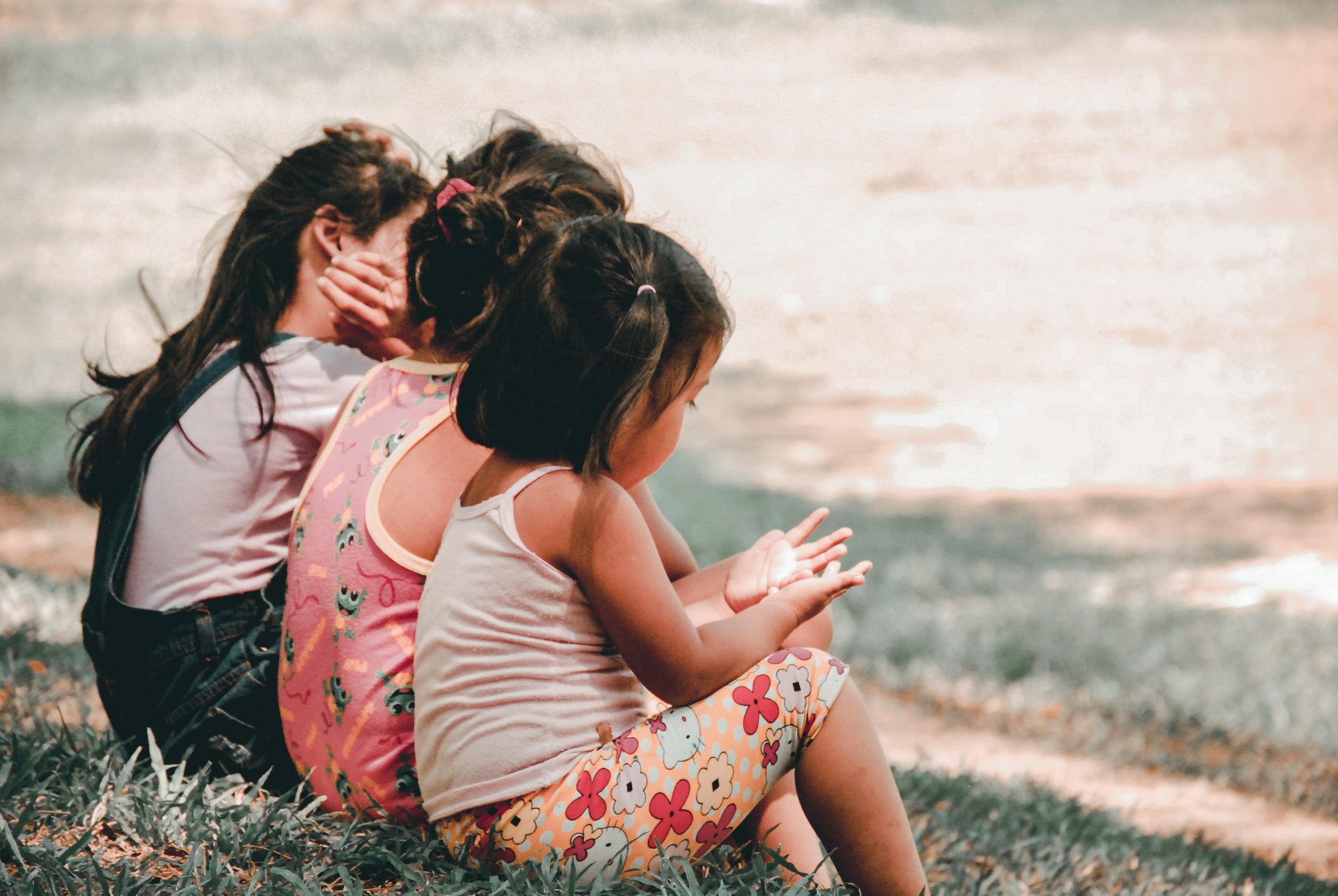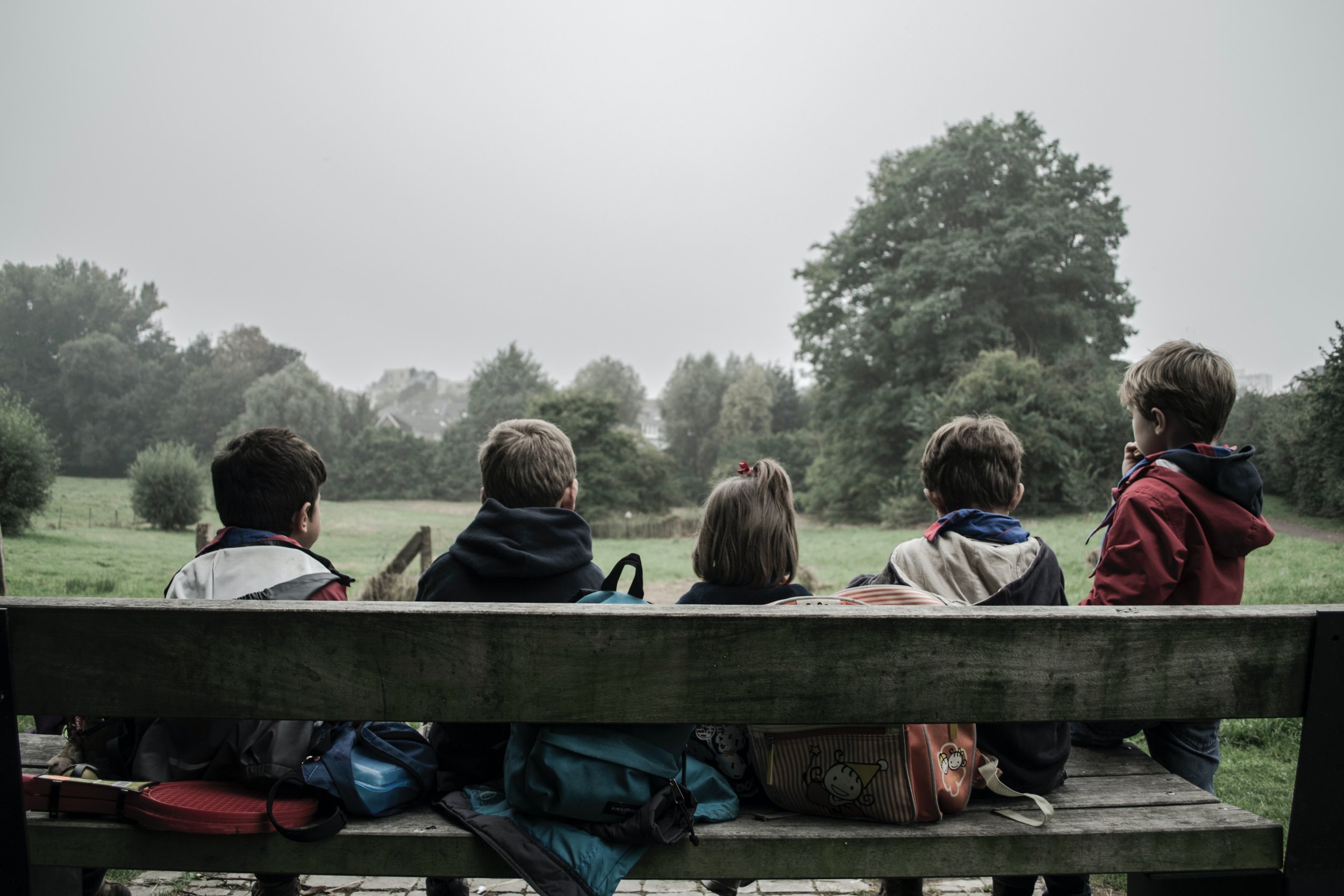Reducing poverty and improving wellbeing: Children’s role in transformational thinking
ID: Three young children sit on grass in dappled sunlight. Photo by Charlein Gracia on Unsplash
Children and young people continue to be sidelined in policy making, even as calls grow for their views and experiences to be included. Sharon Bessell, director of the Children’s Policy Centre, and of the Poverty and Inequality Research Centre at the ANU, takes us through how children should be central to the move to a wellbeing budget and addressing poverty.
Australia is facing a cost-of-living crisis as the prices of housing, energy and food soar and wages fail to keep pace. Rising inflation and climbing interest rates are set to continue, as the standard of living of many families declines.
Of course, for some families, the cost-of-living crisis is not new. Those living on working age benefits, particularly single parent (usually single mother) payments, have long experienced income poverty resulting from policy choices to keep benefits very low. Individuals and families were lifted out of poverty when the Coronavirus Supplements were adopted in March 2020, but were plunged back when the supplements were removed, with only a very small permanent increase of $50 per week. The current crisis is catastrophic for people who were already doing it very tough.
This economic context means that rates of poverty in Australia are likely to increase and more people will be on the edge of poverty.
State, territory, and federal governments are facing major challenges in responding, paricularly in the context of a very large national deficit. Alongside the challenges, potentially transformative discussions are emerging – most notably the announcement by Federal Treasurer, Jim Chalmers, that Australia will move towards a wellbeing budget.
New Zealand has already moved in this direction, with its first wellbeing budget adopted in 2019. Among the priorities is reducing child poverty and improving child wellbeing. In Australia, the ACT has had a wellbeing budget since 2020-2021, with a focus on ‘wellbeing for future generations’ including children and young people.
As Australia considers what a wellbeing budget looks like, reducing child poverty must be a priority. Prior to the COVID-19 pandemic one in six children in Australia lived in poverty (defined as 50% below median income). It is not possible to place wellbeing at the centre of budget processes without addressing that shockingly high rate of child poverty in this very wealthy country.
A wellbeing budget is one element of a broader movement for a wellbeing economy – an approach that advocates economic transformation with the aim of achieving both human and ecological wellbeing. Central to a wellbeing economy is the idea of citizen participation and active engagement. Both a vision for the future and the policies to achieve it are to be co-created and driven by principles of dignity and fairness.
The results of the recent federal election indicate that Australians may be ready for such transformation. As Australia stands at the cusp of what could be a new and just direction, we need to keep in mind not only the urgent need to address child poverty – but also to ensure children are included in the active engagement that characterises ideas of a wellbeing economy.
The United Nations Convention on the Rights of the Child, ratified by Australia in 1990, gives children the right to express their views on matters affecting them, and to have those views taken seriously in decision-making processes. The right to participation has been given little attention in Australia. While youth advisory groups exist across states and territories, children’s views and experiences have remained on the margins of policy-making.
My research – and the research of others – has shown the importance of listening to children’s accounts of both poverty and wellbeing. Notably, children who have generously participated in my research have spoken not only of the material, but also the relational dimensions of poverty. They have explained how low incomes places pressure on family relationships and broader connections within communities, even as people seek to support one another. In recent research, children aged between seven and twelve years, spoke about the importance of mobile phones, but not for the reasons adults might assume. Mobile phones mattered for staying in touch with parents, as well as friends – they are a means of communication and connection with loved ones as much as a channel to social media.
Children also emphasise the unjust nature of poverty, particularly the injustices of homelessness, of the inability to access medical care, of hunger. Again, relationships are central, as children emphasise care, connection and inclusion.
ID: the backs of five children siting on a park bench on an overcast day. Photo by Piron Guillaume on Unsplash
Of course, children – like adults – have a range of views, not all of which are focused on altruism or connection. Overwhelmingly, however, the children who have taken part in my research emphasis the need to make relationships central and to care for one another.
From this perspective, addressing poverty becomes not a matter of conditionality, mutual obligation, or instrumentalism, whereby the aim is to ensure people engage in paid employment. Rather, it becomes a matter of relationships and of care. These are the very principles that a wellbeing economy seeks to embrace. Taking children’s experiences, views, and priorities seriously may not only help us to better understand how to respond to children’s experiences of poverty – it may also help us to reflect seriously on what it is that really matters to society.
The challenges we face require radically different thinking and transformational approaches. Recognising children as active citizens and taking their views seriously may just provide the new perspectives needed to bring about a genuinely fairer society.



